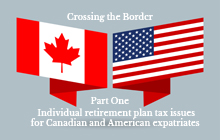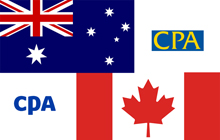International remote work: Tax issues, Part II (Canadian companies)

In part two of a two-part series, George Gonzalez and Gillian Holthe of the University of Lethbridge review key tax issues for remote workers outside Canada
 |
George Gonzalez, PhD is Associate Professor at the Calgary campus of the University of Lethbridge. He is a Chartered Professional Accountant (CPA, CA, Ontario) and a Certified Public Accountant (CPA, Florida). Gillian Holthe, CPA, CA, is an Instructor at the University of Lethbridge and a tax practitioner specializing in corporate and personal tax planning. |
REMOTE WORK has become a common working arrangement in Canada and other countries. Some remote work arrangements are completely domestic in nature, i.e., both the worker and the company they serve are in the same country. Other work arrangements are international, in which the worker and the company are based in different countries[1].
This is the second of a two-part series of articles that reviews key tax issues arising from international remote work arrangements in which the worker lives outside of Canada and serves a Canadian company. In the first part we examined tax issues for the international worker who provides the services. In this second part we review issues for the Canadian company that hires the international remote worker.
Employee or Independent Contractor?
The first issue to be considered is the remote worker’s status under Canadian income tax law: is the worker an employee or an independent contractor? The tax consequences for both the worker and the company flow directly from this determination.
The determination of whether a worker’s relationship with the company is that of an employee or an independent contractor is generally based on four tests. These tests, relied on by both the courts and the CRA, are: the control test, the ownership of tools test, the integration test, and the chance of profit or loss test[2][3].
Based on my observation, companies oftentimes seek to establish an independent contractor relationship with the remote worker to avoid having to deal with the obligations that come with an employer-employee relationship. To provide value-added advice for the client who has entered, or is planning to enter, a remote working arrangement with a worker, a tax adviser should consider these tests and advise the client accordingly.
This issue can be critically important for a very important reason: the potential for a CRA audit of the company’s relationship with the remote worker. There could be significant negative ramifications if a company proceeds on the basis of an independent contractor agreement with the remote worker and at some point in the future the CRA determines that the relationship is that of an employer-employee, not a client-independent contractor. The CRA could issue an assessment that requires the employer to pay retroactive employee withholdings for income tax, CPP and EI. Late payment interest and penalties could also result.
Tax ramifications – Employee Status
If the remote worker is an employee, from a Canadian tax perspective the employer would generally be responsible for complying with Canadian obligations in the same way as if the employee was a Canadian tax resident, regardless of whether the employee is a Canadian tax resident or a non-resident. The employer would be required to withhold income tax, CPP and EI from the employee’s pay, and issue a T4 tax slip after year-end.
Beyond Canadian obligations, , the employer would need to consider foreign country payroll obligation requirements for the employee’s country of residence[4][5]. For example, if the employee resides in the United States, the Canadian employer may be required to withhold U.S. federal and state income taxes and federal social security taxes. There may also be obligations for state-specific unemployment and/or disability payroll deductions and remittances.
An important point for the Canadian company is whether having an employee based in a foreign country may result in the company being deemed to have a permanent establishment in that country. A discussion of the ramifications of a Canadian company’s permanent establishment in a foreign country is beyond the scope of this article, but it is a point to be considered[6].
Tax ramifications – Independent Contractor Status
In the case of an independent contractor relationship with the remote worker, if the remote worker is considered a Canadian tax resident, then the Canadian company does not have to concern itself with any special tax requirements such as withholding of tax.
Where the remote worker is an independent contractor and a non-resident of Canada for tax purposes, the key issue is whether the Canadian company is required to withhold tax on payments to the remote worker, and what type of withholding to apply. In such cases, the company may be required to comply with either the Regulation 105 withholding rules or the Part XIII non-resident withholding tax rules.
Regulation 105 tax withholding for lower-level services: For “lower-level” services[7], a set of rules referred to as Regulation 105 applies. Under Regulation 105, a Canadian company that pays for services provided by a non-resident independent contractor is required to withhold a 15% provisional income tax on payments to the remote worker, remit the withheld tax to the CRA, and submit year-end reporting on these withholdings to the CRA.
The remote worker will file a Canadian non-resident T1 income tax return to report the self-employment income and applicable income tax withholding. They will calculate income tax on the income under Part I of the Income Tax Act, include the provisionally withheld taxes as a credit, and either pay a balance owing or request a tax refund based on the difference between the provisionally withheld tax and the actual tax.
If the remote worker resides in a tax treaty country and does not have a permanent establishment in Canada, then under most of Canada’s tax treaties the self-employed business income would not be subject to Canadian income taxation[8]. In such case the non-resident remote worker may apply to the CRA for a waiver from Regulation 105 withholding[9]. If the CRA grants the waiver, the remote worker provides the approved waiver document to the Canadian client, which instructs the company to discontinue withholding the provisional tax on payments made to the non-resident remote worker.
Without Regulation 105 tax withholding, the non-resident remote worker will not need to file a Canadian income tax return, unless they have other Canadian-source income that must be reported in a non-resident T1 income tax return.
Non-resident tax withholding for higher-level services: A non-resident’s income from a “higher-level” of service[10] is considered to be a “management or administrative fee” by the CRA[11]. Here, Canada’s non-resident withholding tax rules under Part XIII of the Income Tax Act apply. They require that the Canadian company withhold 25% on payments to the non-resident, remit the withheld tax to the CRA, and submit year-end reporting to the CRA on those payments.
Most commonly, a remote worker’s services would be “lower-level” and/or routine in nature, not “higher-level” of a “management or administrative” nature. Therefore, Regulation 105 withholding, rather than Part XIII non-resident tax withholding for “management or administrative fees”, would usually apply for non-resident remote workers, and the worker would pay tax under Part I (unless there is an exemption under a tax treaty as previously discussed).
In cases where Part XIII withholding for management or administrative services might apply, it is important to note that many of Canada’s tax treaties provide an exemption from taxation on an independent contractor’s management or administrative fees[12]. Under such a tax treaty exemption, the Canadian company would not need to withhold tax, and the remote worker would not be subject to Part XIII income taxation.
It is therefore important to determine whether the remote worker’s services are “management or administrative” in nature, and, if so, whether there is an applicable tax treaty exemption which would exempt the Canadian company from applying Part XIII non-resident tax withholding on its payments to the non-resident remote worker.
Conclusion
A Canadian company that hires a remote worker based outside of Canada must consider several tax issues. This second part of a two-part series of articles reviewed the following key tax issues:
- Employee versus independent contractor
- Tax issues in an employer-employee relationship
- Regulation 105 tax withholding in a client-independent contractor relationship
- Part XIII non-resident tax withholding in a client-independent contractor relationship
A tax adviser should carefully consider the issues outlined in this article when assisting a client who is contemplating, or has already entered, an arrangement with a remote worker based outside of Canada.
Read part one of this two-part series: International remote work: Tax issues, Part I (workers).
FOOTNOTES
[1] Many remote workers are “digital nomads,” some of whom work in countries that offer digital nomad visas. These are temporary work visas specifically geared for international remote workers. Typically, a host country that issues a digital nomad visa will permit the international remote worker to temporarily reside and work in the country, provided that work is performed for outsiders only. Under such visas the digital nomad is not permitted to work for local clients, so as to not take jobs away from host country workers.
[6] A good discussion of the principle of permanent establishment is Bloomberg Tax’s What Is Permanent Establishment?.
George Gonzalez, PhD is Associate Professor at the Calgary campus of the University of Lethbridge. He is a Chartered Professional Accountant (CPA, CA, Ontario) and a Certified Public Accountant (CPA, Florida). Gillian Holthe, CPA, CA, is an Instructor at the University of Lethbridge and a tax practitioner specializing in corporate and personal tax planning. Title image: Luke Peters on Unsplash.











(0) Comments